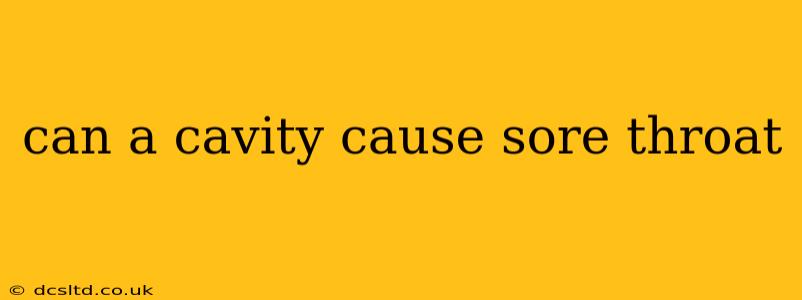Can a Cavity Cause a Sore Throat? Understanding the Connection
While a cavity itself doesn't directly cause a sore throat, the complications arising from an untreated cavity can sometimes lead to throat pain. The connection isn't straightforward, and it's crucial to understand the indirect pathways involved. Let's explore this relationship in detail.
How Cavities Can Indirectly Lead to Sore Throat Pain
A cavity, or dental caries, is a hole in the tooth caused by tooth decay. The decay process involves bacteria breaking down tooth enamel, leading to potential infections if left untreated. These infections, rather than the cavity itself, can sometimes trigger symptoms that affect the throat. Here's how:
-
Infection Spread: A severe, untreated cavity can lead to an infection of the tooth's pulp (the inner part of the tooth containing nerves and blood vessels). This infection can spread to surrounding tissues, potentially impacting the jawbone and even, in rare cases, leading to an infection in the throat area. This is often accompanied by other symptoms beyond just a sore throat, such as swelling, fever, and difficulty swallowing.
-
Referred Pain: Pain from a severe toothache can sometimes be felt in other areas of the face and neck, including the throat. This is called referred pain, and it's a common phenomenon where pain originating in one area is felt in another. The nerves in the mouth and throat are interconnected, so pain signals from a severely decayed tooth might be misinterpreted by the brain as originating from the throat.
-
Swallowing Difficulties: An extensive cavity or infection can make chewing and swallowing difficult and painful. The act of swallowing itself can then become a source of throat irritation and soreness.
-
Poor Oral Hygiene: Untreated cavities are often associated with poor oral hygiene. The same poor hygiene practices that contribute to cavities can also increase the risk of throat infections due to an accumulation of bacteria in the mouth.
Can Tooth Infections Cause a Sore Throat?
Yes, tooth infections are a far more likely cause of throat pain than a cavity itself. As mentioned above, an infection stemming from an untreated cavity can spread, leading to a sore throat. This type of infection is usually accompanied by other noticeable symptoms.
What are the Symptoms of a Tooth Infection?
Symptoms of a tooth infection can include:
- Severe toothache: A persistent and throbbing pain.
- Sensitivity to hot and cold: Increased sensitivity to temperature changes.
- Swelling: Swelling of the gums or face.
- Fever: A high body temperature.
- Pus: Drainage of pus from the affected area.
- Difficulty opening the mouth: Limited range of motion in the jaw.
- Lymph node swelling: Swollen lymph nodes in the neck.
When to See a Doctor or Dentist
If you're experiencing a sore throat along with any symptoms of a tooth infection, it's crucial to seek professional help immediately. A dentist can diagnose the issue and provide appropriate treatment. Delaying treatment can lead to more serious complications. A doctor should also be consulted if the sore throat is severe or accompanied by high fever.
Is it always a tooth infection if I have a sore throat and dental issues?
No, a sore throat can be caused by many things, including viral or bacterial infections of the throat itself. A sore throat accompanied by dental problems doesn't automatically indicate a tooth infection. However, it's essential to rule out dental causes, especially if you have existing cavities or notice other dental symptoms.
In conclusion, while a cavity itself is unlikely to directly cause a sore throat, the complications of an untreated cavity, particularly infections, can contribute to throat pain. If you experience a sore throat along with dental problems, seeking professional medical and dental advice is crucial to identify the underlying cause and receive appropriate treatment.
